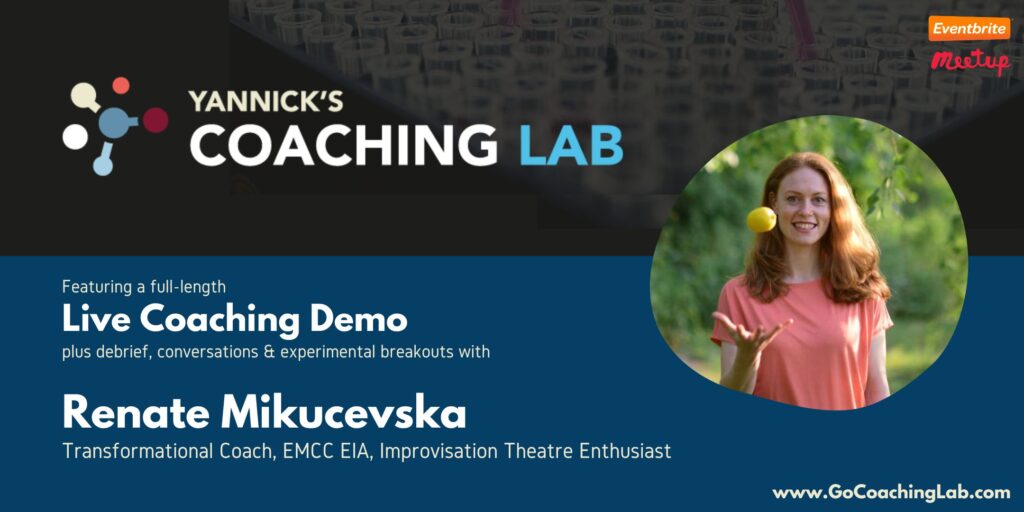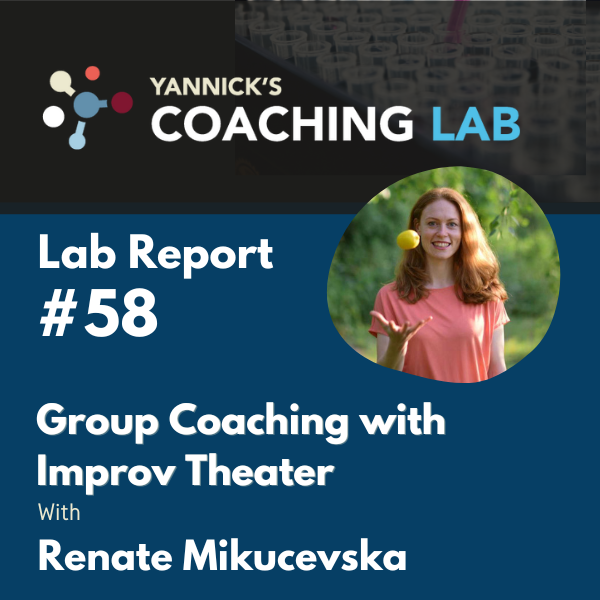
Yannick’s Coaching Lab features guest coaches from a broad variety of approaches, who showcase how they work as part of a live 45min coaching session, followed by reflections and Q&A with the audience.
Curious to know what this session was like? Have a peek at the Lab Report below or consider VIP membership to access the full recording of this and many more exciting sessions.
Yannick’s Coaching Lab #58 — Renate Mikucevska
Lab Report by Natalie Fraser
Session Summary
Renate and her group had not met before the coaching session today. The initial agreement was that the session would last 45-60 minutes and include improv exercises along with reflections and coaching conversations. Albeit not much actual coaching taking place during the first 45minutes, the series of improv exercises elicited very rich material, brought to the fore group and individual dynamics, and the reflections and Q&A part of the Lab saw a broad range of exciting ways to combine coaching and improvisation games emerge for both group and 1:1 work. The audience left excited for the rich potential of using creative improv techniques in their coaching.
Significant moments
Setting the space – Renate suggested to the group that they agree an order to speak in, allocating each person a number and inviting them to add the number to their onscreen name. Renate invited the group to unmute themselves, and explained that they would be staying together and not using breakout rooms.
What sparked your interest in coming? Renate invited each group member to briefly introduce themselves, why they were interested in joining the coaching group, and what they would like from the group to get the most from it?
Expectations – Renate started with a disclaimer that the session is not focused on improv comedy, which is a common assumption, but rather improv as a way of being. Renate invited the group to use their bodies and movement as part of the process. Renate acknowledged that this would be the first and last time that the group would meet in this way.
Building a story exercise – One word at a time. Renate asked the group for a word for inspiration, and group member suggested “hope” which Renate accepted as a title. After a first attempt, Renate invited the group to reflect on any adjustments to improve the experience. This included: arranging each other in order on their screens, speaking clearly and loudly, moving slowly, repeating if the next person didn’t hear. A new title was chosen: “bravery”.
Yes, and… – Building on the practice of story creation, Renate introduced a core principle of improv “yes and” with the themes of reinventing an everyday object. The group members were able to add a whole statement, not just one word. The everyday object selected to reinvent was: “a toaster”. The exercise was repeated with a new theme: “how will the new year be?”. With all the group being coaches, the exercise was repeated with the theme of “reinventing coaching”. This time without Renate taking part, Renate shared a picture from a Latvian animation movie called “flow” and invited the group to describe a world based on this picture. The exercises was repeated with a new picture of a woman juggling fire.
Reflections After each exercise, Renate gave space for the group to briefly reflect on their experience of the exercise to suggest any adjustments for improvement. Longer reflective spaces were offered after the later exercises, with reflections on feelings, imagination, themes, and the group dynamics emerging. Especially at the beginning, as sense of the story being pulled in different directions by the different members was experienced. Notably, the group noticed their cohesion in storytelling improving as they engaged in more exercises together.
Key Insights
Even the simplest exercises brought rich psychological material to the fore.
Participant 6 shared that she was next to her daughter who was in earshot of the conversation. The facilitator contracted that it would be okay if the child were to spontaneously participate as unexpected influences are welcomed in improv.
Coaching a group of coaches who are primed to make meaning may have positively impacted how the group process went.
Participants shared feelings of becoming more of a group over time, and a reduced sense of questioning whether they’re doing it right or self-consciousness. Trust and understanding may have contributed to becoming more in sync.
The improv allowed the participants to be very present and in the moment.
These simple exercises brought out many meaningful themes to consider.
Reflecting on these exercises inspired group members to consider how they could be valuable in one-to-one sessions too, e.g. by combining 1:1 preparation and integration sessions with the group experience.
Renate shared that “yes, and…” is as much about saying it to ourselves as it is an exercise for improv.
As a facilitator, Renate approaches disruptive or disengaged group members by meeting people where they are, being slow and gentle, and addressing what improv is and how to become more comfortable. In general, Renate recognizes that doing improv with people who don’t want to do it can be dangerous and tries not to work with people who are not comfortable engaging. Renate also uses a disclaimer to set expectations upfront, assuring people that they will not be asked to perform in front of people.

